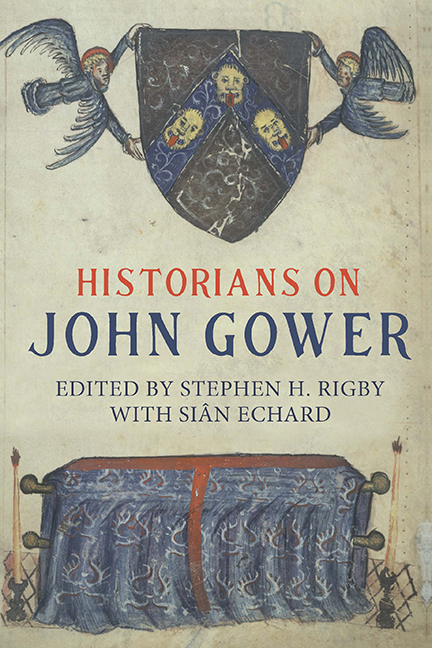Book contents
- Frontmatter
- Dedication
- Contents
- List of Illustrations
- Notes on Editors and Contributors
- Acknowledgements
- List of Abbreviations
- A Note on the References
- Preface: Gower in Context
- PART I Gower’s Life and Works
- PART II GOWER AND LAY SOCIETY
- PART III GOWER AND THE CHURCH
- PART IV GOWER AND GENDER
- PART V GOWER AND POLITICS
- PART VI GOWER AND COSMOGRAPHY
- Select Bibliography
- Index
- VOLUMES ALREADY PUBLISHED
5 - Towns and Trade
Published online by Cambridge University Press: 26 May 2022
- Frontmatter
- Dedication
- Contents
- List of Illustrations
- Notes on Editors and Contributors
- Acknowledgements
- List of Abbreviations
- A Note on the References
- Preface: Gower in Context
- PART I Gower’s Life and Works
- PART II GOWER AND LAY SOCIETY
- PART III GOWER AND THE CHURCH
- PART IV GOWER AND GENDER
- PART V GOWER AND POLITICS
- PART VI GOWER AND COSMOGRAPHY
- Select Bibliography
- Index
- VOLUMES ALREADY PUBLISHED
Summary
Gower's Commercial Anxieties
It has often been suggested by scholars that John Gower, like other contemporary poets, found it hard to reconcile his conception of an ideal social order with the realities and complexities of a new commercial world. In this view, Gower was a conservative voice fighting anachronistically against the tide of recent socio-economic change, his attitude towards merchants being seen as at best equivocal whilst his stance towards retailers was one of strident antipathy. Janet Coleman, for instance, suggests that writers such as Gower were ‘fearful of the traditional world being turned upside down by the rising third estate’. Ethan Knapp presents Gower's views on towns and trade as constituting a response to ‘the emergent economic forces (and their social agents) in his own day’ and argues that even though Gower accepted the need for trade, he also had a ‘deep ambivalence’ about the effects of growing commercialisation which was corroding traditional social structures. Yet, in reality, the ‘emergence’ of a mercantile elite and of a monetised and commercialised economy had been in train for nearly two hundred years by the time Gower was writing. Indeed, the kinds of criticisms of commerce made by Gower were already evident in the work of social commentators of the thirteenth and early fourteenth centuries as much as they were in the post-Black Death era.
More recent scholarship on Gower, merchants and the city has sought to reassess the late-fourteenth-century context for his writings and suggests that the poet was more aware of the contemporary concerns of his audience than has often been recognised. Thus, Jonathan Hsy argues that while the detailed description of London's trade offered in the Mirour de l’Ommeostensibly adopts the framework of traditional anti-mercantile tropes such as the figure of ‘Triche’, the poet's flexible linguistic style produced a more nuanced perspective on the urban milieu than he is often given credit for. Roger Ladd has similarly examined the sophisticated ways that Gower critiqued mercantile practices and notes that while the Mirour de l’Ommelists the frauds which trade could involve, it also presents trade as a social good, a view which would have appealed to its likely mercantile audience as would Gower's criticisms of alien merchants.
- Type
- Chapter
- Information
- Historians on John Gower , pp. 191 - 212Publisher: Boydell & BrewerPrint publication year: 2019
- 1
- Cited by



